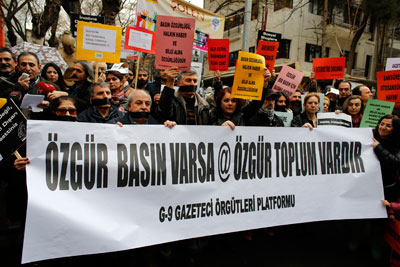New York, May 9, 2014–The Committee to Protect Journalists welcomes the release from jail on Thursday of Fusün Erdoğan, former general manager of Özgür Radyo, and Bayram Namaz, a columnist for the weekly Atılım, and urges Turkish authorities to remove restrictions on their travel and lift their prison sentences on appeal.
Both journalists were imprisoned in September 2006 on a series of anti-state charges, including “breaching the Constitution,” “forming organizations with the intention of committing crimes,” “possessing hazardous substances without permission,” “endangering public safety intentionally,” “damaging property,” and “forgery of official documents,” among others. In November 2013, the Tenth Court of Serious Crimes in Istanbul sentenced Erdoğan and Namaz to life in jail. The journalists’ lawyers told CPJ that they have filed appeals to the Supreme Court of Appeals, and await hearing dates.
CPJ featured Erdoğan in a recent campaign to free imprisoned journalists for World Press Freedom Day, May 3.
Last month, Turkish authorities freed three other reporters, according to press reports and local journalists and lawyers. They are Ahmet Birsin, general manager of the television channel Gün TV; Hasan Özgüneş, a columnist for the daily Azadiya Welat; and Kaan Ünsal, a reporter for the biweekly Yürüyüş. Birsin and Özgüneş were imprisoned in recent years in a crackdown against pro-Kurdish journalists and news outlets which authorities accused of supporting the banned Kurdistan Workers Party, or PKK, and the KCK, an umbrella group of pro-Kurdish organizations that includes the PKK. Ünsal was imprisoned after being charged with membership in the banned Revolutionary People’s Salvation Party/Front (DHKP/C). The three journalists still face trial.
All five journalists are barred from traveling outside Turkey, their lawyers told CPJ.
At least 16 journalists continue to be imprisoned in Turkey, CPJ research shows.
“We welcome these releases and urge the authorities to continue until Turkey has no journalists behind bars or under threat of imprisonment,” said CPJ Deputy Director Robert Mahoney. “This is a transformative year for Turkish democracy, and media should be free of all political and judicial interference in order to provide the information and platform for debate that citizens need.”
When CPJ conducted its annual prison census in December 2013, Turkey was the world’s worst jailer with at least 40 journalists behind bars. Since then, 24 journalists have been freed from Turkish jails, but most are still facing charges. Their releases came after Turkey introduced changes to its anti-terrorism laws, reducing the term for detention without conviction from 10 years to five years, and because of judicial reform that eliminated certain courts with special authority. These courts heard cases related to terrorism and organized crime and were granted higher authority than regular criminal courts, but that authority was widely abused, as documented by several local and international rights organizations, including CPJ.
EDITOR’S NOTE: The alert has been corrected to reflect that Kaan Ünsal was imprisoned after being charged with membership in the banned DHKP/C party–not the banned PKK party.
